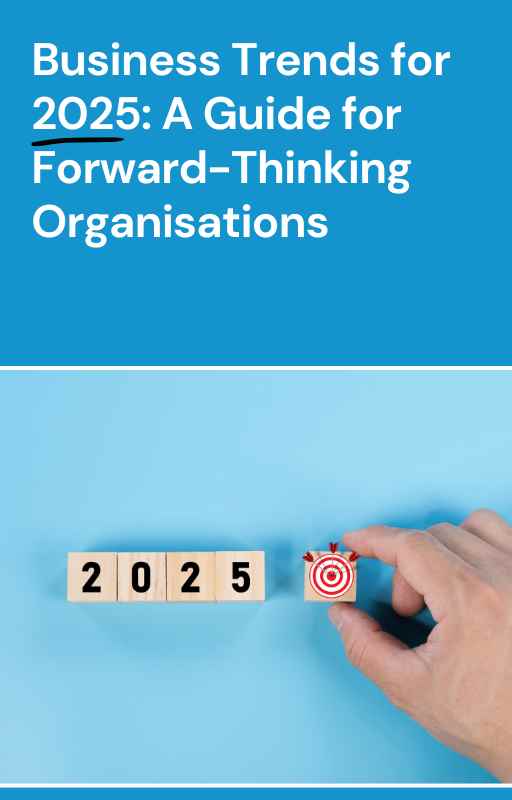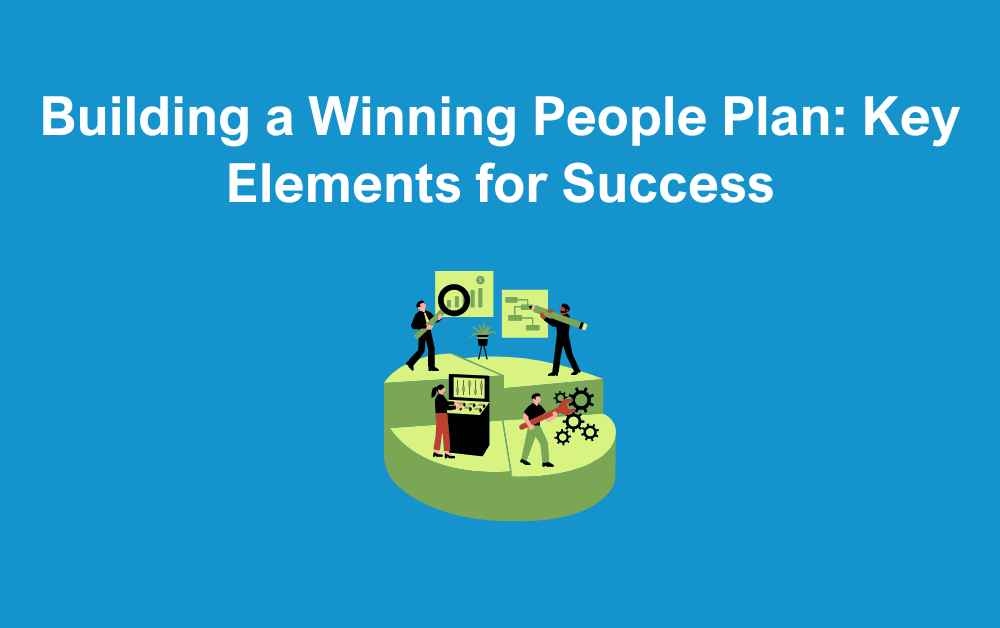As we move into a new year, organisations must prepare for evolving challenges and opportunities in the workplace. A robust people plan is crucial for navigating new legislation, economic shifts, and workforce trends. Employers who prioritise strategic workforce planning can foster employee satisfaction, maintain compliance, and build a resilient, future-ready organisation.
The new year is set to be another challenging one for employers, with legislation such as the National Insurance increase for employers on the horizon. It’s more important than ever to put robust plans in place to give your business and people the best chance of thriving.
This blog will outline key areas to focus on in your people plan for the year ahead, including new legislation, workforce trends, and practical tips to ensure success. Every organisation has unique objectives and challenges, so priorities will differ. Our overview of next year’s top HR trends helps you focus on those that align with your company culture and goals.
Why a People Plan is Essential for Success
A people strategy aligns your human resources strategy with overall business objectives, taking a holistic view of organisational needs and outlining how to support wider goals through your people. It highlights a commitment to workforce development and wellbeing while focusing on how the team will deliver organisational success.
Creating a people plan provides clear direction for leaders by defining accountability within key areas. This clarity streamlines decision-making, enabling efficient progress towards achieving business objectives.
A well-thought-out plan also allows organisations to anticipate and manage workforce challenges, enhance employee satisfaction, and build a competitive edge. As legislation changes and trends like AI, hybrid working, and diversity shape the workplace, proactive planning ensures compliance and resilience. Employers who invest in their people are better equipped to drive business growth and innovation.
New Legislation to Consider in Your People Plan
1. Sexual Harassment Duty
From October 2024, employers face new legal duties to prevent sexual harassment in the workplace. This legislation places proactive obligations on employers to create a safe and respectful environment.
- Action Points:
- Review and update policies on workplace harassment.
- Provide regular anti-harassment training for employees and management.
- Implement reporting mechanisms and ensure prompt action on incidents.
2. Employment Rights Bill
The new Employment Rights Bill is set to enhance protections for employees, including rights for flexible working and improved redundancy protections for pregnant employees.
- Action Points for your people plan:
- Ensure compliance with flexible working requests and transparency in decision-making.
- Update employee handbooks to reflect enhanced redundancy protections.
- Stay informed about changes to statutory leave entitlements.
3. National Insurance Rate Increasing for Employers
From April 2025, the employer NI rate will rise from 13.8% to 15%. This change will have a big financial impact on businesses.
- Action Points:
- Assess the financial impact of NIC increases.
- Review budgets and adjust workforce planning to mitigate the cost rise.
- Consider investments in technology to improve efficiency and offset rising expenses.
Key Workforce Trends to Include in Your People Plan
1. Upskilling and Reskilling
The pace of technological change requires employers to invest in upskilling and reskilling their workforce. If you are unable to hire new employees in the new year due to the financial strain of NI rate increases, upskilling staff can be a good solution. Employees value opportunities for growth, and organisations benefit from a more adaptable team. As part of your people plan, you can:
- Identify skill gaps in your workforce.
- Provide training programmes in critical areas such as leadership, digital transformation, and emerging technologies.
- Encourage a culture of continuous learning through mentoring and online platforms.
2. Mental Health Absence Management in a People Plan
Managing mental health absences effectively is crucial for fostering a supportive and productive workplace. By prioritising mental health in your people plan, you can create an environment where employees feel valued and empowered to seek help when needed.
- Develop a Clear Mental Health Policy: Outline procedures for reporting mental health absences and provide clear guidance on available support.
- Train Managers in Mental Health Awareness: Equip leaders with the skills to recognise signs of mental health issues and respond appropriately.
- Offer Employee Assistance Programmes (EAPs): Provide access to counselling services, mental health resources, and confidential support for employees.
- Promote a Positive Work Environment: Encourage open conversations about mental health and reduce stigma through awareness campaigns.
- Flexible Working Options: Introduce flexibility in work arrangements to support employees dealing with mental health challenges.
- Regular Check-Ins: Implement regular one-to-one meetings to discuss employee wellbeing and identify any concerns early.
- Review and Adjust Workloads: Monitor workloads to prevent burnout and excessive stress, which can contribute to mental health issues.
- Access to Mental Health Training for Staff: Offer training sessions to help all employees understand mental health and build resilience.
- Measure and Monitor: Track absence data related to mental health and use insights to adapt strategies and improve support.
Including these actions in your people plan will help your organisation address mental health absence effectively, demonstrating a commitment to employee wellbeing and organisational success.
3. Leveraging AI in HR
Artificial Intelligence (AI) is revolutionising HR processes, from recruitment to performance management.
- Automate routine tasks such as CV screening and interview scheduling.
- Use AI-powered tools for employee engagement surveys and performance analysis.
- Ensure transparency in AI systems to maintain trust among employees.
4. The Rise of the 4-Day Working Week
The 4-day working week has gained traction as organisations explore new ways to boost productivity while improving work-life balance.
- Pilot the 4-day week on a trial basis to measure impact.
- Use data to monitor productivity, employee satisfaction, and customer outcomes.
- Create clear policies to manage workload expectations.
5. Strengthening Company Culture
A strong company culture is essential for attracting and retaining top talent. Employees are increasingly prioritising workplaces where values, communication, and inclusivity align. You can include this in your people plan by:
- Defining and communicating your company values clearly.
- Invest in leadership training to promote consistent management practices.
- Encourage feedback and employee participation in shaping workplace culture.
6. Diversity and Inclusion
Diversity, Equity, and Inclusion (DEI) are more than buzzwords—they are essential components of a thriving workplace.
- Develop clear DEI policies and goals.
- Offer unconscious bias training to employees and leaders.
- Monitor diversity metrics and share progress transparently.
7. Adapting to a Distributed Workforce
The shift to hybrid and remote working continues to redefine traditional workplaces.
- Equip your teams with the tools and technology to collaborate effectively.
- Focus on outcomes and productivity rather than micromanaging schedules.
- Prioritise employee wellbeing and regular communication to maintain engagement.
8. Skills-Based Hiring
Skills-based hiring prioritises a candidate’s skills over formal qualifications. This approach widens your talent pool and fosters diversity.
- Reframe job descriptions to focus on skills required for success.
- Use skills assessments during the recruitment process.
- Offer training for candidates who may lack specific qualifications but show potential.
Download our free eBook on Business trends for 2025

To help you with your people plan for the new year, we have created a business trends for 2025 eBook to help you decide what should be included. Get your free copy on our website.
Tips for Creating a Successful People Plan
- Assess Your Current State: Start by evaluating your workforce’s skills, engagement levels, and wellbeing. Use employee surveys to gather honest feedback.
- Define Clear Objectives: Align your people plan with your business goals, focusing on key areas like retention, compliance, and growth.
- Engage Leaders and Teams: Involve managers and employees when developing and rolling out your plan to encourage buy-in and accountability.
- Prioritise Flexibility: The workplace is evolving, so your plan must adapt to changes in legislation, technology, and employee expectations.
- Measure Success: Set measurable KPIs to track progress, such as employee satisfaction scores, retention rates, and metrics.
How The HR Booth Can Help
At The HR Booth, we specialise in helping organisations create and implement effective people plans. From navigating new legislation to improving company culture, we offer tailored HR solutions that align with your business needs. Our team can support you with:
- Policy updates and compliance with new legislation.
- Developing strategies for upskilling, reskilling, and managing workforce trends.
- Creating practical solutions for a 4-day working week, hybrid working, and diversity initiatives.
Whether you’re a small business or a growing enterprise, we provide expert guidance to ensure your people plan drives success.
Take Action Today
Don’t wait to build your people plan for the new year. By addressing legislation, workforce trends, and employee needs, you can set your organisation up for a successful and productive year ahead. Contact The HR Booth today to learn how we can help you create a tailored people plan that delivers real results.







